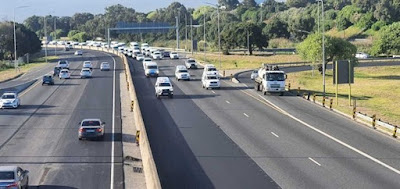 |
| Taxi Operators shut down N2 Highway in protest (Photo supplied). |
A combination of taxi driver and e-hailing service strikes are causing headaches for commuters across Cape Town Thursday morning.
Taxi drivers in Cape Town blocked off the N2 highway, which caused major traffic jams including diversions along R300 and near the Cape Town International Airport.
At least three Golden Arrow buses have been burnt in amid the protests. The buses were found alight in Nyanga, Bloekombos and Eisleben, according to Golden Arrow.
The taxi strike includes drivers from both he Cape Amalgamated Taxi Association (CATA) and Cape Organization for the Democratic Taxi Association (CODETA). The operators plan to visit Premier Alan Winde's office to demand further benefits for taxis.
The drivers say there have been too many instances of their taxis being impounded and unfair requirements to release the impounded vehicles.
The taxi strike comes as e-hailing service drivers including Uber, Bolt and Didi are also on strike this week. The e-hailing strike is expected to end on Thursday. Drivers have urged one another to switch off their apps so that nobody from the e-hailing services is working.
Some reports indicated drivers in Cape Town patrolled the city to ensure none of their colleagues were accepting passengers.
E-hailing drivers are demanding further regulation of their platforms by the South African government. The drivers accused the platforms of exploiting their service and giving more power to riders in cases of disputes. They are also unhappy with the impact of rising fuel prices and high commissions on their earnings.
The full list of grievances from the e-hailing drivers was sent to Transport Department officials. It includes:
- Stop the practice of determining prices on behalf of operators;
- Abolish uneconomic prices and encourage competition and new business entity entry into the sector;
- Create a fair regulatory environment that enables investment in an equitable and socially responsible manner;
- Guard against the creation of App monopolies that compete at the expense of operators and drivers.
Comments